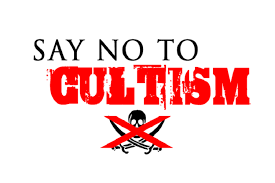Rising cases of cult attacks worrisome
Since the mid-1980s when cultism became a source of violence and carnage in our society, many lives have been lost and many more wounded. Unfortunately, the trend is becoming more brazen, with victims sometimes attacked in broad daylight. This happens in some higher institutions’ campuses and on the streets, to the chagrin of well- meaning […]

anti cultism
Since the mid-1980s when cultism became a source of violence and carnage in our society, many lives have been lost and many more wounded. Unfortunately, the trend is becoming more brazen, with victims sometimes attacked in broad daylight. This happens in some higher institutions’ campuses and on the streets, to the chagrin of well- meaning citizens.
According to Wikipedia, cult “is a lay term for a group perceived as requiring unwavering devotion to a set of beliefs and practices which are considered deviant outside the norms of society. Such groups are typically perceived as being led by a charismatic leader who tightly controls its members.”
In Nigeria, they come under different names and modus operandi, and most times deadly.
Between January 2024 and November 4, 2024, 134 people were killed in fierce cult attacks across 14 states. The states include Anambra which tops the chart with 32 cult killings, Edo 19, Benue 13, Rivers 13, Imo 12, Ogun 11, Kwara 9, Delta 7, Osun 6, Lagos 4, Ebonyi 3, Akwa Ibom 2, Bayelsa 2 and Oyo 1. Anambra and Ogun states, in recent months, became almost overburdened by cult killings.
- Reps move to stop multiple budgets
- Man breaks wife’s hand, leg for attending clinic without permission
Some of these senseless killings included the war between the Aiye and the Eiye confraternities that occurred on February 7, 2024 at Ikoyi power line area, Ilesa in Osun State, which claimed the lives of six people.
There was also the killing of seven people in a supremacy war between the Black and the Red cult groups in the North Bank area of Makurdi, Benue State, on February 5, 2024, while nine others were killed when a fight broke out between two rival cult groups in Awka, the Anambra State capital, on April 1.
Eight people were killed in inter-cult war between two warring cult groups in Awarra and Ochia communities, Ohaji/Egbema LGA of Imo State in September; four also lost their lives in a similar cult war in Umuka community, Nawfia, Njikoka LGA of Anambra in October 2024.
Latest incidents include the killing of six persons in Edeoha community, Ahoada East LGA of Rivers State on October 20; the killing of four persons at the North Bank area of Makurdi in Benue on November 4, and the death of a man in Obele community of Emohua LGA of Rivers State.
The troubling aspect is that this culture is found in many of our tertiary institutions where students, rather than pay attention to learning, engage in these wanton acts.
The Inspector General of Police, Kayode Egbetokun, had in a statement in June said the fights among cult groups were largely about supremacy and control of territories, which often lead to loss of lives and pain to their parents and society.
“We need to fight this menace in our society, and parents need to pay special attention to their children, encouraging them to read and stay away from peer pressure. We need to take these youths away from the devious crimes that are affecting the social fabric of our society,’’ he said.
We at Daily Trust believe that cultism is nothing but evil as it involves the coming together of a group with deviant beliefs and practices that are not only exclusively kept away from the knowledge of others but such activities are carried out at odd hours of the day.
Some plausible causes of cultism include peer group influence, parental background, drug and substance addiction, societal decadence, poor education standards, loneliness and the lack of recreational facilities.
We observe that cultism has continued to survive partly because of the patronage from the society, including politicians who use cultists either as hit men during elections or for assassinating political opponents. While some become cultists in their search for protection, others join cult groups to avenge an assault or a painful past. Some students become cultists out of the desire to become “Big Boys” and superior to their peers.
To halt the rising tide of this menace, parents must give more quality time and attention to their children’s moral development than they give to their businesses or office work. Good parenting requires bridging all communication gaps between parents and their children.
In essence, there is an urgent need to rebuild the strong family value our society is well known for. This will enable both parents and the society to take responsibility for the development of the younger ones.
We also call on the National Orientation Agency (NOA) to be in the vanguard of enlightening the public on the dangers of cultism. Government must demonstrate genuine political will to protect lives from cult attacks. The need to deploy modern technology in surveillance, intelligence and detective operations of security agencies cannot be more strategic than now when criminal elements have become more sophisticated.
Our tertiary institutions also have the responsibility of drawing up measures that will adequately engage our youths in learning and shaping their character that will be to the advantage of the larger society.
Cultism is evil and must be treated as such.
